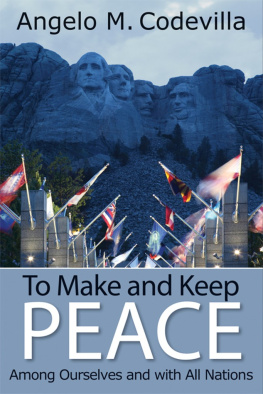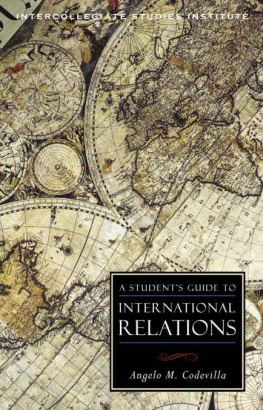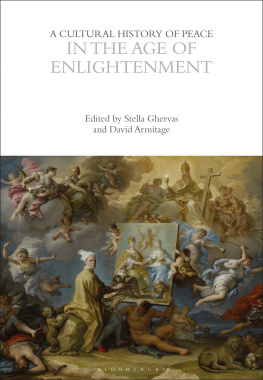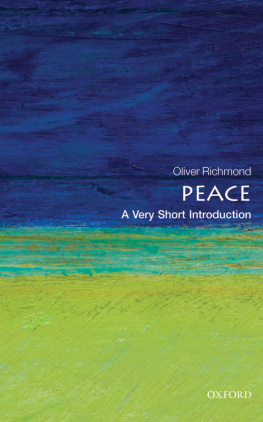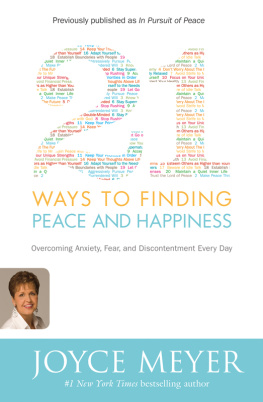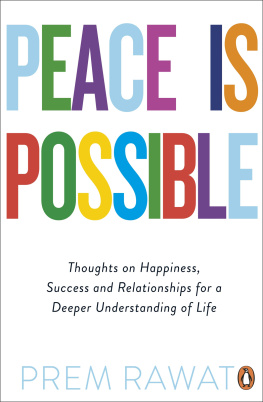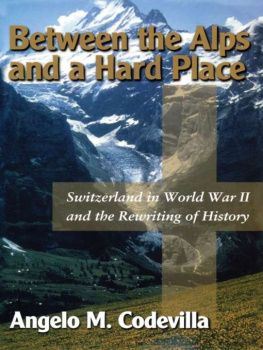To Make and Keep
PEACE
Among Ourselves and with All Nations
The Hoover Institution gratefully acknowledges the following individuals and foundations for their significant support of the Working Group on the Role of Military History in Contemporary Conflict
VICTOR AND KAREN TRIONE
WILLARD AND MARGARET CARR
THE LYNDE AND HARRY BRADLEY FOUNDATION
To Make and Keep
PEACE
Among Ourselves and with All Nations
Angelo M. Codevilla
HOOVER INSTITUTION PRESS
STANFORD UNIVERSITY
STANFORD, CALIFORNIA
The Hoover Institution on War, Revolution and Peace, founded at Stanford University in 1919 by Herbert Hoover, who went on to become the thirty-first president of the United States, is an interdisciplinary research center for advanced study on domestic and international affairs. The views expressed in its publications are entirely those of the authors and do not necessarily reflect the views of the staff, officers, or Board of Overseers of the Hoover Institution.
www.hoover.org
Hoover Institution Press Publication No. 645
Hoover Institution at Leland Stanford Junior University,
Stanford, California 94305-6010
Copyright 2014 by Angelo M. Codevilla
All rights reserved. No part of this publication may be reproduced, stored in a retrieval system, or transmitted in any form or by any means, electronic, mechanical, photocopying, recording, or otherwise, without written permission of the publisher and copyright holders.
For permission to reuse material from To Make and Keep Peace Among Ourselves and with All Nations, ISBN 978-0-8179-1714-2, please access www.copyright.com or contact the Copyright Clearance Center, Inc. (CCC), 222 Rosewood Drive, Danvers, MA 01923, 978-750-8400. CCC is a not-for-profit organization that provides licenses and registration for a variety of uses.
Hoover Institution Press assumes no responsibility for the persistence or accuracy of URLs for external or third-party Internet websites referred to in this publication, and does not guarantee that any content on such websites is, or will remain, accurate or appropriate.
First printing 2014
Manufactured in the United States of America
Cataloging-in-Publication Data is available from the Library of Congress.
ISBN: 978-0-8179-1714-2 (cloth. : alk. paper)
ISBN: 978-0-8179-1715-9 (pbk. : alk. paper)
ISBN: 978-0-8179-1716-6 (epub)
ISBN: 978-0-8179-1717-3 (mobi)
ISBN: 978-0-8179-1718-0 (PDF)
To Ann
my very own Beatrice
The Lord bless thee and keep thee
The Lord make his face to shine upon thee and be gracious unto thee
The Lord lift up his countenance upon thee
And give thee peace.
Numbers 6:2426
... to do all which may achieve and cherish a just and lasting peace among ourselves and with all nations.
Abraham Lincoln
Peace is the highest aspiration of the American people.
Ronald Reagan
Contents
by Victor Davis Hanson
Foreword
To Make and Keep Peace Among Ourselves and with All Nations is being published under the auspices of the Hoover Institution Press in connection with the Working Group on the Role of Military History in Contemporary Conflict, of which Angelo Codevilla is a member and whose mission is reflected in explaining current crises through study of the wars of the past. Codevilla is perhaps best known to the reading public for two influential worksthe coauthored War: Ends and Means (with the late Paul Seabury) and, more recently, The Ruling Class. Those two books provide a proper introduction to To Make and Keep Peace Among Ourselves and with All Nations.
The first, War: Ends and Means is a historical survey of how wars begin, are often waged, and why they either end successfully in peace or lead to further instability and conflicts. The work proved an insightful, if not blunt, reminder that utopian pacifism and idealistic internationalism more often provoke and prolong conflicts than ensure peace. In contrast, a more lasting settlement follows when wars prime aim is to defeat the enemy, discredit its cause, and remove the political conditions that led to acts of aggression in the first place.
Grandiose notions of nation-building, democracy spreading, and international governance become mere slogans, if a power does not first focus on what it wants from its resort to arms, whether it has the necessary means to achieve its military aims, and whether it possesses a clear idea of the desired contours of the postwar landscape. Implicit in Codevillas argument was a paradox: the increasing military power of modern affluent democracies is accompanied by a growing misunderstanding about and even misuse of such preeminent force. More precisely, the more powerful we become, the less confident we are in using power for national, much less moral, interests.
The Ruling Class offered a bookend domestic argument to War: Ends and Means that echoed many of these same tragic themes. Our twenty-first-century American coastal eliteprepped at tony universities, shaped by postmodern relativism, trusting in a huge government overseen by a self-appointed technocracy, exempt often from the practical ramifications of their own starry-eyed ideology, and deeply skeptical of traditional American valueshas captured the reins of power of both American political parties, not to mention the media, foundations, universities, and the arts.
This cultural nexus often has little empathy for traditional American protocols, at least as defined by limited government, the influence of Judeo-Christian religion, and rugged individualism and personal liberty rather than a mandated equality of result. The elite, at least in theory, apparently prefers to see America as either unexceptional or exceptionally out of tune with preferable notions of democratic socialism abroad.
Codevilla now combines the arguments of these two prior diverse works into his latest reflection about how To Make and Keep Peace Among Ourselves and with All Nations. His argument is again unapologetic and straightforward. Despite unprecedented military power, America is fighting more wars abroad than ever and winning almost none of them, much less improving American stature in the world or its ability to help our friends and punish our enemies. Such confusion is largely the result of the flawed ideas of the ruling class. Without a learned approach to the pasts stern lessons, and knowledge of timeless human nature, the ruling elite frenetically jumps from one conflict to another, rarely with clear ideas of what our interests are, and thus without any notion of the means necessary to achieve our ends. Certainly, our latest experience in Afghanistan and Iraq, and especially American misadventures during the Arab Spring in our efforts in Egypt, Libya, and Syria, bear out Codevillas warnings that we contemplate social and political quick fixes without first ensuring that we have defeated and discredited the enemyto the degree we can even agree on who he is.
Codevilla quotes liberally from primary texts of a long Western literary and philosophical tradition, emphasizing both the unchanging nature of mankind and thus the need for a tragic acceptance of wars unchanging laws. He then illustrates the abstract and theoretical with relevant allusions to major wars in Western history, while driving home contemporary lessons by direct allusions to Americas most recent misadventures of the post-9/11 era.

